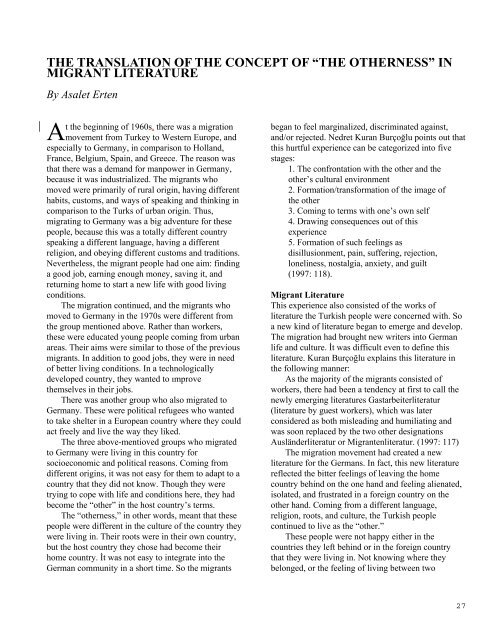their - The University of Texas at Dallas
their - The University of Texas at Dallas
their - The University of Texas at Dallas
Create successful ePaper yourself
Turn your PDF publications into a flip-book with our unique Google optimized e-Paper software.
THE TRANSLATION OF THE CONCEPT OF “THE OTHERNESS” IN<br />
MIGRANT LITERATURE<br />
By Asalet Erten<br />
A<br />
t the beginning <strong>of</strong> 1960s, there was a migr<strong>at</strong>ion<br />
movement from Turkey to Western Europe, and<br />
especially to Germany, in comparison to Holland,<br />
France, Belgium, Spain, and Greece. <strong>The</strong> reason was<br />
th<strong>at</strong> there was a demand for manpower in Germany,<br />
because it was industrialized. <strong>The</strong> migrants who<br />
moved were primarily <strong>of</strong> rural origin, having different<br />
habits, customs, and ways <strong>of</strong> speaking and thinking in<br />
comparison to the Turks <strong>of</strong> urban origin. Thus,<br />
migr<strong>at</strong>ing to Germany was a big adventure for these<br />
people, because this was a totally different country<br />
speaking a different language, having a different<br />
religion, and obeying different customs and traditions.<br />
Nevertheless, the migrant people had one aim: finding<br />
a good job, earning enough money, saving it, and<br />
returning home to start a new life with good living<br />
conditions.<br />
<strong>The</strong> migr<strong>at</strong>ion continued, and the migrants who<br />
moved to Germany in the 1970s were different from<br />
the group mentioned above. R<strong>at</strong>her than workers,<br />
these were educ<strong>at</strong>ed young people coming from urban<br />
areas. <strong>The</strong>ir aims were similar to those <strong>of</strong> the previous<br />
migrants. In addition to good jobs, they were in need<br />
<strong>of</strong> better living conditions. In a technologically<br />
developed country, they wanted to ımprove<br />
themselves in <strong>their</strong> jobs.<br />
<strong>The</strong>re was another group who also migr<strong>at</strong>ed to<br />
Germany. <strong>The</strong>se were political refugees who wanted<br />
to take shelter in a European country where they could<br />
act freely and live the way they liked.<br />
<strong>The</strong> three above-mentioved groups who migr<strong>at</strong>ed<br />
to Germany were living in this country for<br />
socioeconomic and political reasons. Coming from<br />
different origins, it was not easy for them to adapt to a<br />
country th<strong>at</strong> they did not know. Though they were<br />
trying to cope with life and conditions here, they had<br />
become the “other” in the host country’s terms.<br />
<strong>The</strong> “otherness,” in other words, meant th<strong>at</strong> these<br />
people were different in the culture <strong>of</strong> the country they<br />
were living in. <strong>The</strong>ir roots were in <strong>their</strong> own country,<br />
but the host country they chose had become <strong>their</strong><br />
home country. İt was not easy to integr<strong>at</strong>e into the<br />
German community in a short time. So the migrants<br />
began to feel marginalized, discrimin<strong>at</strong>ed against,<br />
and/or rejected. Nedret Kuran Burçoğlu points out th<strong>at</strong><br />
this hurtful experience can be c<strong>at</strong>egorized into five<br />
stages:<br />
1. <strong>The</strong> confront<strong>at</strong>ion with the other and the<br />
other’s cultural environment<br />
2. Form<strong>at</strong>ion/transform<strong>at</strong>ion <strong>of</strong> the image <strong>of</strong><br />
the other<br />
3. Coming to terms with one’s own self<br />
4. Drawing consequences out <strong>of</strong> this<br />
experience<br />
5. Form<strong>at</strong>ion <strong>of</strong> such feelings as<br />
disillusionment, pain, suffering, rejection,<br />
loneliness, nostalgia, anxiety, and guilt<br />
(1997: 118).<br />
Migrant Liter<strong>at</strong>ure<br />
This experience also consisted <strong>of</strong> the works <strong>of</strong><br />
liter<strong>at</strong>ure the Turkish people were concerned with. So<br />
a new kind <strong>of</strong> liter<strong>at</strong>ure began to emerge and develop.<br />
<strong>The</strong> migr<strong>at</strong>ion had brought new writers into German<br />
life and culture. İt was difficult even to define this<br />
liter<strong>at</strong>ure. Kuran Burçoğlu explains this liter<strong>at</strong>ure in<br />
the following manner:<br />
As the majority <strong>of</strong> the migrants consisted <strong>of</strong><br />
workers, there had been a tendency <strong>at</strong> first to call the<br />
newly emerging liter<strong>at</strong>ures Gastarbeiterliter<strong>at</strong>ur<br />
(liter<strong>at</strong>ure by guest workers), which was l<strong>at</strong>er<br />
considered as both misleading and humili<strong>at</strong>ing and<br />
was soon replaced by the two other design<strong>at</strong>ions<br />
Ausländerliter<strong>at</strong>ur or Migrantenliter<strong>at</strong>ur. (1997: 117)<br />
<strong>The</strong> migr<strong>at</strong>ion movement had cre<strong>at</strong>ed a new<br />
liter<strong>at</strong>ure for the Germans. In fact, this new liter<strong>at</strong>ure<br />
reflected the bitter feelings <strong>of</strong> leaving the home<br />
country behind on the one hand and feeling alien<strong>at</strong>ed,<br />
isol<strong>at</strong>ed, and frustr<strong>at</strong>ed in a foreign country on the<br />
other hand. Coming from a different language,<br />
religion, roots, and culture, the Turkish people<br />
continued to live as the “other.”<br />
<strong>The</strong>se people were not happy either in the<br />
countries they left behind or in the foreign country<br />
th<strong>at</strong> they were living in. Not knowing where they<br />
belonged, or the feeling <strong>of</strong> living between two<br />
27

















